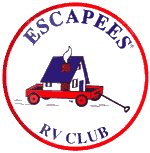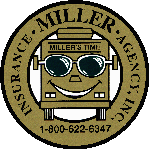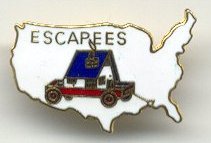Need Help Getting
Started?
A Guide for Foreigners
purchasing an RV to tour the North America
(Written in 1999 but hopefully still useful)
Shortly after
retirement, we decided to rent our house in England and undertake
an extensive tour of the USA by motor home. We purchased a 37-foot class A motor home and tow car, the latter being used for
local sightseeing and shopping trips. The tour which lasted
nearly three years took us throughout the USA, extended visits
were also made to Canada & Mexico.
|
While preparing for the tour we undertook a lot of
research but could not find a guide covering many of the issues which
confront a foreign visitor. In particular, the requirements for driving
licenses, insurance and registration etc. seemed complex, but with help from
several sources, especially the CompuServe RV Forum (you must be a member of
Compuserve to access the RV Forum) and the Escapee RV Club, we worked our
way through the maze. There are no doubt other ways and options available,
however, we hope this guide will make the task easier for others considering
such a venture. Please note this guide is not a legal statement in any form
but simply our understanding of the requirements.
|
|
 |
Choosing an
address
A US address is essential for insurance, vehicle
registration, mail forwarding and the like. Surprisingly, foreigners may have
more freedom than US citizens when deciding which state to use for an address,
since no state has a prior claim on your assets. It can pay to have several
addresses for different reasons. Sales tax varies by state, therefore choosing
an address in a state with low or no sales tax, can save thousands of dollars
when purchasing an RV or car. An address in Oregon can be a big advantage for RV
registration since Oregon has no sales tax. It is worth noting that you can
probably buy the RV from any dealer in any state and by using an Oregon address,
no sales tax is due. In this case, delivery normally has to be taken outside the
purchasing state. By the way, do not pay the dealer's asking price for an RV!
Reductions of more than 20% are normal.
Addresses can be obtained in
several ways.
- Many mailbox companies offer such a
service, they are listed in the yellow pages.
- The dealer selling the RV
will frequently help out. The salesperson is sometimes
happy for you to use their address.
- RV clubs are particularly
useful and they frequently supply other useful services.
We initially used a PO Box
address in North Carolina which we found in yellow pages,
subsequently changing to the Escapee RV Club address in Texas.
Insurance
This is probably the most difficult area but surprisingly,
it was easier to obtain insurance for the large motor home than for our car!
While the fundamentals for insurance are the same throughout the USA, individual
states can and do impose their requirements. Not all insurance companies can
issue insurance for every state. So it is important to obtain an address for
insurance purposes in a state your chosen insurance company can issue cover for.
You must also decide what level of coverage to take out. The coverage for each
of the following main items can normally be set within reason, to almost any
level
- Bodily Injury
- Collision
- Property Damage
- Personal Injury
- Medical
- Work loss
- Uninsured motorist bodily injury
The most costly items are bodily injury, collision and
property damage. We heard on several occasions that perhaps half of American
drivers are not insured! Do not forget to bring with you a letter from your
previous insurance company. In our case, it was more cost-effective to insure
the RV and car through different insurance companies.
Insure the RV with a RV insurance
specialist, since an RV needs a combination of vehicle and home
owners insurance. A few of the most popular are:-
National General
Insurance Company
Good Sam VIP, PO Box 66937 St Louis
MO 63166-9908
Tel 1 800 847 2886
|
|
 |
| |
|
|
Millers Insurance
Agency
5805 SW Willow Lane, Lake Oswego
OR 97035-5342
Tel 1 800 622 6347
Email info@millerrvinsurance.com
Internet http://www.millerrvinsurance.com
|
|
 |
| |
|
|
RV Alliance America
(formally Alexander & Alexander)
11100 NE 8th Street
Suite 900 Bellevue
WA 98004-4441
Tel 1 800 521 2942 |
|
|
We used a company called RVIP,
but they merged with Millers in late 1998 so things may have changed, however at the time RVIP was much cheaper than Millers
for similar cover.
Strangely foreigners normally find it more difficult to
insure a car than an RV. Initially, we insured the car with National General,
however, we transferred to AIG (see below) which has a special section for
foreigners. AIG was not only much cheaper but provided more coverage and did not
require a US driving license. The only condition was having to pay a membership
fee for the first year, but the total cost was still worked out far cheaper.
American International Cos
PO Box 15510, Wilmington
DE 19850-9252
Tel 1 800 841 7027
Driving license
We found it unnecessary to obtain an American driving
license, using instead International Driving Permits. Every state issues its
driving license Many insurance companies require a US driving license to be held
for three years before they will remove the uplift, which is typically 30 to
50%. This uplift seems to be similar to that applied to holders of international
driving permits, therefore there appears to be little advantage in obtaining a
US driving license We did investigate obtaining a license but ran into a problem
with the Texas Department of Motor Vehicles (DMV) insisting we must first obtain
a US social security number. After some months of communication with the Federal
Government, we obtained written confirmation that a social security number is
unnecessary for foreigners! On occasions, a driving license would be handy for
identification purposes but in practice, any form of ID seems to work
Vehicle Registration
Having arranged insurance you then need to register the
vehicle with the DMV in your chosen state. Registration is a process similar to
the British vehicle licensing system. The DMV issue a "Title" which is your
proof of ownership and will be required when selling the vehicle. In addition,
the DMV issues tags (number plates) to display on the vehicle.
Not all states will allow
registration by mail. The initial and annual cost varies
considerably from state to state. Be careful since a few states
levy a property tax based upon a percentage of the RV’s
value, which can work out very expensive. Some states also
require the vehicle to pass a safety and/or emission test.
Our RV and car were registered in
Texas, which is one of the cheaper, but not the cheapest state.
Visas
Without a visa, visits are limited to three months under
the visa waiver scheme. Even with a ten-year visa, a stay is normally limited to
six months. We heard one couple report they obtained a one-year stay, but they
had a pre-booked return flight and had to prove financial sufficiency. We found
having a pre-booked return flight restricted our travelling freedom. It was
relatively straightforward to obtain a 10-year visa from the US embassy in
London.
The INS (US Immigration) is occasionally not too friendly
and can be reluctant to grant a six months stay, but normally do so following
questions about one's financial sufficiency etc. After entry, it is possible to
apply for an extension, which we did on one occasion. However, the extension
cost about $90 and took over 3 months to process. We found it easier to plan our
trip such that we either visited Canada or Mexico for a while and then upon
return to the US, obtaining a further 6 months.
Banking
It was unnecessary to have a US bank account. Several
reports have convinced us that there is no advantage and indeed it can be more
expensive. No US bank has branches in every state, so even if one decides to
open a US bank account, there will be times when a branch is not available
locally.
Most of our expenditure was paid for using credit cards.
The statement went to our UK bank, which paid the bill out of the current
account, and then forwarded the statement to us for checking. We have yet to
find a mistake.
Cash can be obtained from ATMs everywhere. Some ATMs charge
a fee of about $1 per transaction but as we could each draw up to $400 a time,
we did not get too excited. During the past three years, we were given a few US
cheques. We just sent them by post to our UK bank for payment into our account.
On the rare occasion when it was not possible to pay a bill by credit card e.g.
vehicle registration, a money order from a local post office or convenience
store solved the problem.
The only time it was necessary to make a special
arrangement, was when purchasing the RV and car. In this case, we pre-arranged
with our UK bank to transfer the money directly to the dealer's bank, upon
receipt of a fax from us. For security reasons, we had previously agreed with
the bank, code words to be included in the fax request.
Mail Forwarding
We found it essential to have a
mail forwarding service located in the USA. Not only have we been
surprised by the amount of mail we received within the US, but it
made it easier to have our UK mail held in the USA until we are
ready to call it off. There are a lot of mail forwarding
services, two of the most popular for RV’ers are FMCA and
Escapees. Both organisations bill you with the actual postage
incurred.
- FMCA only forward on a
specific day of the week but the service is free to club
members.
- Escapees are the largest
mail forwarding organisation in the US. They are very
flexible and will forward mail any day by any carrier.
There is an annual fee.
We used the Escapee service
Voice Message Service
Initially, we opened a voice
message service in case somebody needed to contact us in an
emergency. In practice we found the service to be a very useful
way to keep in touch with the many American friends we made.
Again there are many such
services. We used the FMCA service which is not only very
effective but is also used by many fellow RV’ers. The
service cost $5 a month.
RV Clubs
There are several of RV clubs,
three of which we found useful to join.
Good Sam (Trailer Life)
This club gives 10% discount at thousands of campgrounds.
They have an excellent campground directory with 50,000
listings.
2575 Vista Del Mar
Drive, Ventura, CA 93001
Tel 805 667 4100
Email goodsam@tl.com
Internet www.goodsamclub.com
|
|
 |
Escapees RV Club
Ideal club for full-timers. They have the best magazine and own several
campgrounds which provide good, cheap camping. In addition, they have an
excellent mail forwarding service and a cheap calling card and itemised
phone billing service. They hold regular rallies and the biannual
Escapades have excellent seminars and entertainment. We use the Escapee
mail forwarding address for vehicle insurance and registration purposes.
100 Rainbow Drive,
Livingston, TX 77351
Tel 1 888 757 2582
Fax 409 327 4388
Internet http://www.escapees.com/
|
|
 |
FMCA
The voice message is reason enough to join and they have
an interesting magazine.
8291 Clough
Pike,Cincinnati, OH 45244 -2796
Tel 1 800 543 3622
Internet http://www.fmca.com/
|
|
 |
Computers
Our notebook computer turned out
to be almost indispensable. We used it for :-
Email
We found Email to be an excellent way to keep in touch with the
folk back home. It's easy, quick and most of all cheap. By using
an acoustic coupler we could send and receive Emails from many
public pay phones.
Word processing
Letter writing etc. and keeping a daily log of our travels.
Route planning
The are several excellent and very cheap CD ROM mapping
programmes, which we used to plan trips and provide information
about attractions along the way.
GPS
Some mapping systems can be linked to a GPs receiver. Using the notebook computer
the co-pilot has throughout the journey a detailed road map, at the same time
the GPs display has an arrow showing our exact location and direction of travel.
As one travels the programme also broadcasts the route directions, so it is
much more difficult to get lost! Take care since the copilot can also see what
speed the RV is travelling at!
Finance monitoring
We used Quicken to shadow our accounts and online banking to
transfer money etc. between accounts as necessary.
Income Tax
This may be a grey area, as it depends upon the legal
definition of "Place of Residence" etc. Being UK residents we pay UK income tax,
however, if you spend more than 186 days in the US, then you may become subject
to US taxation. Likewise, you need to spend at least 186 days of each tax year
within the UK. We believe that a double taxation agreement between the US and
the UK prevents paying tax twice. We do not know if this has been put to the
test.
Canada & Mexico
US vehicle insurance provides
full coverage when travelling in Canada, however, a special card
issued by your US insurance company is required when driving in
Canada. This is usually supplied free of charge. US insurance is
not valid in Mexico. Insurance for Mexico can only be issued by a
Mexican insurance company, many such companies advertise in RV
magazines.
Travel Insurance:-
Don't forget to take out travel
insurance before you leave home, as medical treatment in the US
can be very expensive.
Shipping the RV Home
At the end of our tour, we decided to ship the motor home
to England. If you have lived at least 12 months outside the EC and owned a
vehicle for more than six months, no import duty or tax is payable when shipping
it into the UK. There are numerous shipping agents and several ports to choose
from. Our best quote was from Wallenius, who ship from several ports including
Jacksonville, FL which was the most convenient for us. As luck would have it the
port facilities and security arrangements were good. Paperwork for exportation
is straightforward and is mainly handled by the agent but the owner must provide
notarised copies of the vehicle title.
It is possible to insure the RV against damage during
shipment. The cost varies between 1 and 1.5% of the value of the vehicle. We
decided to take a chance which fortunately paid off. All the shippers advised
that personnel possessions cannot be shipped with the vehicle and therefore
contents insurance is not an option. However, the nod and wink were that people
do ship possessions, but obviously, it is at your own risk. We left a lot of
items within the RV which fortunately all arrived safely.
We learnt that Wallenius shipped for Fleetwood and
Winnebago. Wallenius recommend if possible, boarding up the driver's
compartment, so confining access to the driving area. We did this, but the
benefit is almost fully negated as all the keys must be left with the vehicle,
in case the US customs decide to carry out an inspection. The RV had to be at
the port three working days before the sailing date. Shipping time was 11 days
via a modern RORO ferry
The Jacksonville terminus office
for Wallenius is:-
Coastal/Wallenius Terminal
9950 Blount Island Blvd
Blount Island
Jacksonville FL 32206
Tel 904 714 0220
Fax 904 714 0228
On reflection
What initially seemed to be a daunting task, turned to be
relatively problem free once we learnt the ropes. Car insurance was the most
frustrating aspect but this was quickly resolved once we located the right
company. We had a wonderful time during our tour and would heartily recommend it
to anybody considering touring the US in an RV. We kept a travelogue throughout
our travels which together with numerous photographs can be viewed on our web
page at
www.southfieldcam.co.uk/
If we can help in any way feel
free to contact us by Email at
ghbgarner@gmail.com
Happy trails
George &
Valerie Garner
July 1999





